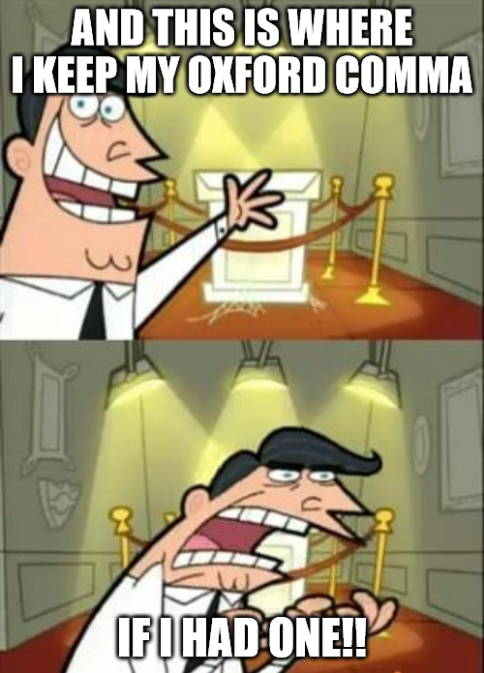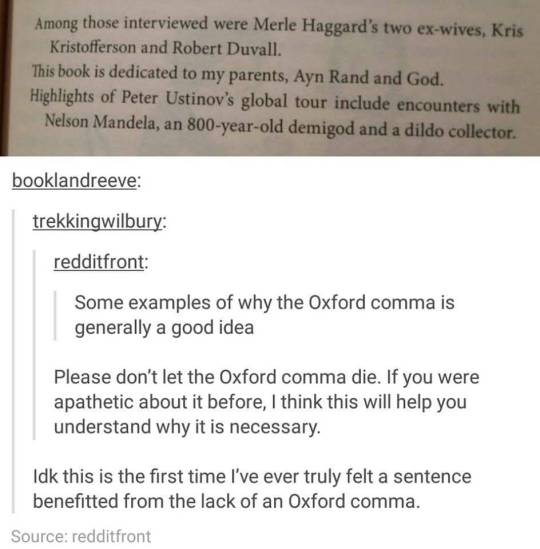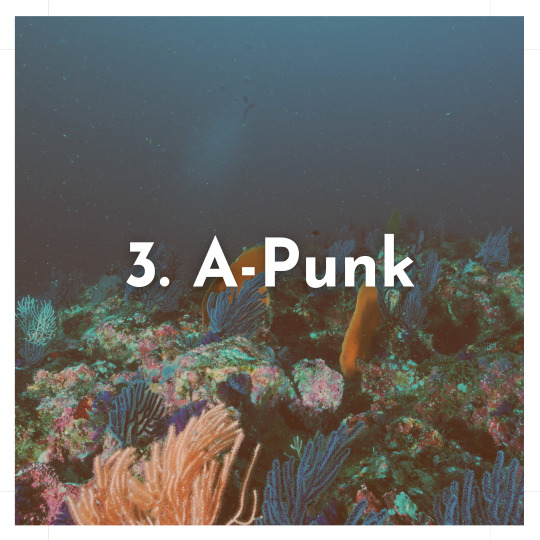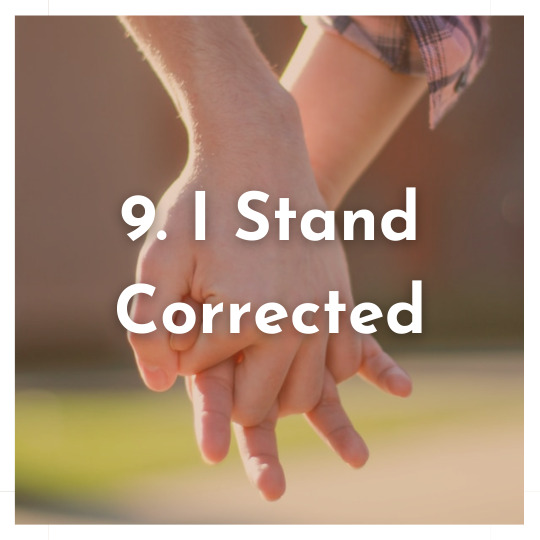#Oxford comma
Text
(also maybe put what generation you are in the tags?)
#i say yes oxford comma#i just had a conversation about it with an older co-worker#and they 1. didn't really know what it was but 2. their initial reaction was hard no#they are probably late gen x#i am a zillennial#oxford comma#polls
7K notes
·
View notes
Text


this is not how I remember the Pogues lineup
#OXFORD COMMA#linguistics#grammar and punctuation#oxford commas#punctuation marks#punctuation#language#grammar
66 notes
·
View notes
Text



Joke courtesy of Alexa.
61 notes
·
View notes
Text
Reblog for bigger sample size
40 notes
·
View notes
Text
Stormlight Archive Characters’ Opinions on the Oxford Comma Debate
(or whatever the Rosharan equivalent is)
Navani: always uses it in her published work, letters, or anything she intends to show others. Feels that it’s important for clarity, and to be taken seriously by her peers. Tends to leave it off (along with most other punctuation and grammar) when she’s scribbling notes for herself. Does not get involved in debates.
Jasnah: stridently anti-Oxford Comma. Knows exactly where it belongs, and could use it correctly if she so chose, but consistently leaves it off just to prove a point. If you misunderstand her that’s your problem.
Shallan: uses it consistently in an attempt to be Proper and avoid attracting negative attention. Won’t join the debate unprompted, but can defend either side if she has to.
Radiant: leaves it off because Jasnah does.
Veil: does not know or care what an Oxford comma is.
Dalinar: hates that this is a thing. Grammar is already so confusing as it is. Tries to use it but often leaves it off or uses it wrong. Tried to do research on the debate but only got more confused.
Gavilar: thinks the Oxford comma is frivolous nonsense. Leaves it off even when it makes his sentences needlessly confusing. Never bothered to learn how or why it should be used. Wouldn’t care enough to debate, but privately makes fun of Navani for using it.
Renarin: doesn’t use any punctuation whatsoever. Has more important things to worry about.
Szeth: consistently follows all rules of grammar unless ordered otherwise
Taravangian: uses it inconsistently, depending on the day
Wit: deliberately takes whatever position most annoys whoever he happens to be speaking with
Nale: has killed at least one person over misuse of commas
#oxford comma#stormlight archive#stormlight archive spoilers#(spoilers are mostly for male characters having opinions on written grammar)
140 notes
·
View notes
Text
You can pry this oxford comma out of my cold, dead hands.
16 notes
·
View notes
Text
the oxford comma should be the very first thing children are taught in school. in fact it should be told to babies fresh out of the womb
15 notes
·
View notes
Note
Can you give your thoughts on the Oxford comma? Asking for a friend. 😏🤓🤣
One of my favorite pro-oxford comma memes: 🤣🤣🤣🤣

If that's not enough to convince you, then you should read all about The Oxford Comma Lawsuit 🤣
In my defense, I'm a slave to APA style. Per APA 7th edition, the Oxford comma is STILL IN!🎉🎉🎉🤣
That's a long-winded way of saying I use the Oxford comma--unless I'm 1000% sure it isn't needed for clarity.
80 notes
·
View notes
Text















Vampire Weekend by Vampire Weekend (2008)
#vampire weekend#mansard roof#ladies of cambridge#arrows#the kids don't stand a chance#albums#bryn#campus#blake's got a new face#cape cod kwassa kwassa#m79#a-punk#walcott#oxford comma
186 notes
·
View notes
Text
you can tear the oxford comma away from my cold, and dead hands.
11 notes
·
View notes
Text
using the oxford comma till the day i die cuz what the fuck
#oxford comma#random shit#oxford comma forever#oxford#comma#LITERALLY FOREVER#FOREVER#till the day i die
14 notes
·
View notes
Text
grammar basics
punctuation
commas are only used:
to separate two independent clauses with a conjunction, e.g., "I went to the park, and and I ate ice cream, so I'd say it was a pretty good day." (A sentence like: "I think we should leave and go home" does not need a comma because the second phrase, "and go home," is a dependent clause.)
to surround nonessential information. This is anything that is not vital to the sentence.
Essential vs. nonessential information examples:
a. "He drove by a row of houses, which were packed tightly together." vs. "He drove by a row of houses that were packed tightly together."
"Which" is indicative of nonessential information, which requires use of a comma, while "that" is used for essential information and does not use a comma.
b. "And then she ran to hug her wife, Sarah." vs. "And then she ran to hug her wife Sarah."
If the subject has only one wife, then the name and title are separated by a comma. But if the subject has many wives, and it must be clarified which wife she's hugging, then the name is essential and does not have a comma. This is true for anything: friends, parents, siblings, coworkers, etc.
for lists. USAmerican journalism does not allow the Oxford comma, but it doesn't matter in other fields, so long as it's consistent.
after an exact date or location is given. Example: "We met on Aug. 13, 2001, and fell in love immediately, but I had to catch a bus to Beaufort, South Carolina, to meet my fiance's family."
Semicolons are used:
to separate two similar independent clauses without a conjunction. Example: "He smirked meanly; it was always so easy to rile his sister." (NOTE: The correct alternative to this sentence is to split it into two, not use a comma; that would be a comma splice.)
for lists, for clarity. Examples: "When I was at grandma's house, I ate green beans; shrimp and grits; and macaroni and cheese"; "When we get home we need to do the laundry; make sure Roger is OK with everyone coming over and ask about his stereo; clean the kitchen; and bury the body." (NOTE: While it's up to preference whether to include the Oxford comma, use the semicolon after each list item.)
Ellipses are only used:
to indicate that part of a quote has been taken out.
Em-dashes are used:
to indicate a pause, e.g. "The kid looked – strange." NOT "The kid looked... strange."
to include nonessential information or give an aside. E.g., "And when I saw her in that dress – blue, just like her eyes – I felt my heart stop."
turns of phrase and redundancies
It's only "whether," NOT "whether or not" – that's redundant.
"Try to" NOT "try and."
Toward, forward, onward, etc., NOT towards, forwards, onwards, etc.
Regarding, with regard to, in regard to. (Never "regards.")
"Unexpected surprise" – all surprises are unexpected.
"Heavy in weight" – so it's heavy.
"X colored" – just say the color.
numbers
Spell out numbers 0-9, and use numerals for 10 and above. This includes things like the fifth and the 11th.
Use numerals for all ages, and hyphenate it. Examples: "His eldest grandchild is 36-years-old, but his youngest is not yet 3-months-old!"
Use numerals for height and measurements, e.g., "The gnome stood proudly at 1-foot and 3-inches tall."; "The dude's got to be at least 6-foot-5."
#there's probably more#but these r just the ones i see a lot in fanfiction#im also tbh high doing this so#grammar#punctuation#oxford comma#fanfiction#fanfic#ao3#ao3 fanfic#archive of our own#writers on tumblr
9 notes
·
View notes
Text
I'd appreciate if you rb so I can get more people's answers but no pressure 🧿
8 notes
·
View notes
Text
oxford comma ur a bad bitch im so sorry people are being mean to you
#doing group work and finding out your partner doesn't use my best friend the oxford comma#devastating#not yr#school#personal#oxford comma
11 notes
·
View notes